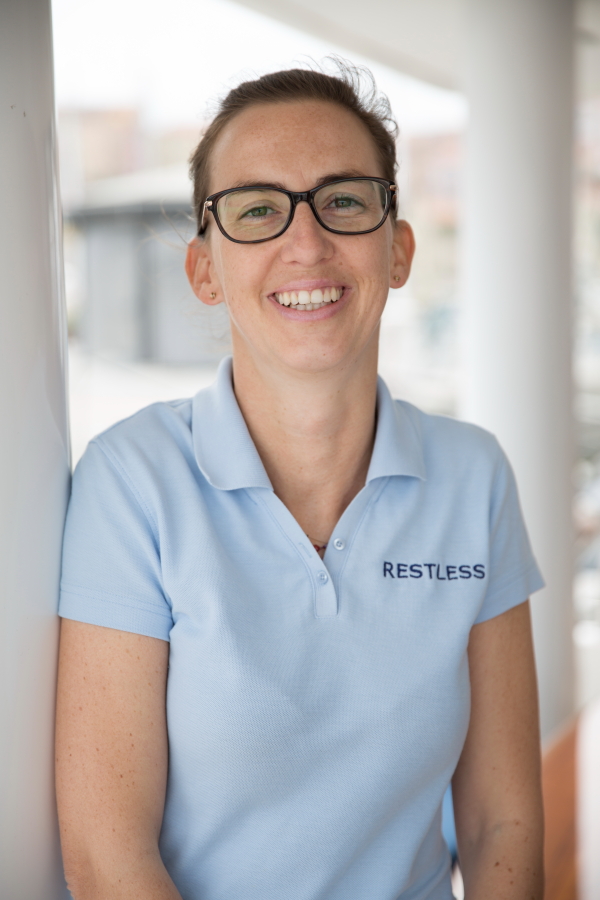Viking Maritime Group Celebrates National Careers Week 2024
This week is National Careers Week (4th-9th March), and to celebrate, we interviewed members of staff at Viking Maritime Group who have worked at sea, to discuss the exciting opportunities a career at sea can offer.
In this blog, you’ll hear personal anecdotes from Viking Crew Head of Crewing, Emily Jaenicke, Viking Crew Assistant Placement Manager, Lien Eggermont, Maritime Skills Academy Head of Training, Dean Stores, and Maritime Skills Academy Senior Maritime Simulator Instructor, John Galloway.
What made you consider a career at sea?
Emily: “Living by the coast certainly had an influence on my decision to start a career at sea. Sailing on ferries as a child, as well as my grandfather being in the Royal Navy, meant that I grew up surrounded by ships. This, combined with my interest in travel, definitely contributed to my decision to start a career at sea.”
Lien: “I didn’t really consider a career at sea before my time as a stewardess. I was thrown into the industry really, as my partner was working on board yachts at the time, and there was a vacancy for a stewardess on a French Billionaire’s yacht. I was always interested in travel and it was fantastic to sail the Mediterranean.

Dean: “I went to school with a friend whose dad was a Captain on the ferries. He suggested that I looked into working at sea as I wanted to go straight from school into training towards a career. I started a deck cadetship with P&O Stena Line, studying at South Tyneside College and completing sea time on the ferries.”
John: “A family friend of ours was working as a Submariner in the Royal Navy and was really enjoying it, so I decided to join as a Junior Rating. When I was able to choose my modules, I eventually went into nuclear submarines, as this is something I was really interested in.
Was a career at sea always an option for you?
Emily: “I don’t think I actually thought about what I wanted to do as a teenager. After finishing school, I went to university to study physics. Towards the end of my first year, however, I began questioning why I was there. My brother, at the time, was already studying a cadetship, and suggested I consider a career working on cruise ships, starting as a cadet.
So, I got in contact with Viking Crew. It was very coincidental timing, as the intake for a cadetship at Warsash Maritime School was starting in a few weeks, and I decided to enrol. I guess it was meant to be really.”
Lien: “No, I grew up in Belgium where there isn’t a lot of coastline, so yachting was never something I had considered. The industry had always been much more of secret society and wasn’t advertised as widely as it is now. If it wasn’t for my partner encouraging me to join him, I probably wouldn’t have had a career at sea at all.”
Dean: “No, it was more of a last minute decision. I was originally going to study at college to be a Carpenter but wanted a career with more freedom and opportunities.”
John: “In my day, the careers advisors at school weren’t open about different industries. Opportunities within the Merchant Navy weren’t widely talked about, so I only knew about the Royal Navy. I wasn’t aware of all the possibilities surrounding different vessels. If I knew of the Merchant Navy at the time, I probably would have applied there straight away instead.”
What was your first role?
Emily: “I began my cadetship as a deck cadet, training to be a Navigation Officer.
During the first phase, I worked with the deck crew, which involved a lot of painting, chipping, working with ropes, and learning the basics of the nautical side of shipping.
Then I went back to college, expanded my knowledge, and later put it into practice during my next sea phases. I worked closely with bridge officers, working with the charts, learning celestial navigation, and planning routes.”
Lien: “I began as a stewardess, and worked my way up to a chief stewardess over the course of seven years. This involved performing all responsibilities to a high standard. However, it can also involve being a cook, or helping out on the deck – it’s very varied. The owner of the first yacht I worked on loved fishing, and so unfortunately, he wanted me to make soup with the catch of the day! Gosh, how I hated the smell of that soup.”
Dean: “I worked on the ferries as a Deck Officer for a few years and then decided to enter the yacht industry. I worked on M/Y Azzam for a total of nine years, starting out as a 2nd Officer, and working my way up to Chief Officer for the last five years. I loved travelling to different countries, my favourite was Croatia for the beautiful scenery.”
John: “Nowadays, the Royal Navy certifications are interchangeable with the Merchant Navy, however this was not the case in my day. I went to work in the North Sea as an uncertificated Engineer, and attended the City of Glasgow College where I gained my 1st Engineer licence. I then worked as a 2nd Engineer at North Star Shipping on oil rig service vessels. However, I get very sea-sick, so the North Sea is not the place you want to be!”
Would you recommend a career at sea?
Emily: “100%, yes. I came back much more independent, and appreciative of different cultures and religions. I travelled to Africa, down to Antarctica, the Caribbean, Canada, the Baltic, and saw both sides of Russia. It was absolutely incredible and you get paid to do it at the same time.”
Lien: “Yes, I would. You get to see so many places. The south of France is always nice, Italy and the Turkish coastlines are also very pretty. Every place has something special that you remember.
You also get to work with different cultures and people. You can also learn a lot from the influential people that you may work closely with.”
Dean: “I would definitely recommend a career at sea. You are paid during your training and aren’t left with student debt. With a cadetship, you gain experience whilst you are training and leave fully qualified for that position, so usually it makes it easier to find a job afterwards as you already have a lot of experience in the field.”
John: “Of course, yes. A life at sea isn’t for everybody, but for those who do take the opportunity, it’s definitely worth it. If you’re considering a career at sea, then I would encourage you to speak to others in the industry to learn more before embarking on a career at sea.”
What opportunities can a career at sea offer?
Emily: “Travel. Friendships. Maturity. Independence. Resilience. Multitasking. Good all-round skills that are transferable in many ways, so that when you eventually come ashore, you can apply these skills to your next role.”
Lien: “Working at sea will certainly set you a few steps ahead for when you come ashore, and if you’re savvy with your money you will have a nice pot of savings too.
There’s lots of transferable skills you need working in the yachting industry, but at the same time, a lot of the skills can be transferred back ashore, especially within the hospitality industry. If you work on luxury, high-end yachts, you’ll have been dealing with potentially very difficult clients, so it gives you more resilience when you come back ashore.”
Dean: “You are often able to progress through ranks as you work your way up. A career at sea also offers the opportunity to work ashore. Within the industry, depending on which ships you work on, there are different roles available. Passenger ships, offshore vessels, and yachts all require specific positions, so there are opportunities to work in a variety of exciting roles.”
John: “The one thing I would say is, age equals experience – and that’s a valuable commodity in this industry. There’s many opportunities with shipping companies, and you can go ashore when it suits you. It’s a lifelong career, but that doesn’t mean it is for everyone. Nevertheless, take every opportunity, as you never know what will come of them.”
What advice would you give to someone deciding on a career at sea?
Emily: “Go for it! Just because you’re deciding to do something now, doesn’t mean you can’t change your mind in five years time. So what is the risk? The risk is if you don’t do it you’re going to think “what if?”
I’d also advise sailing on a ship somewhere before you embark on a life at sea, just to make sure you don’t get seasick!”
Lien: “I would advise working in a high-end hospitality role such as a restaurant or hotel, as many clients require some level of work experience, to prepare the seafarer for their career at sea. This will give you transferable skills that can be easily applied to the yachting industry, specifically if you would like to work in the interior. A couple of years working ashore is ideal before transferring to yachts in your early 20s.”

Dean: “Make sure you do your research about the different types of roles and cadetships available, to ensure you choose the best one for your interests and abilities. Search around to decide which type of vessel you would like to work on.
One of the hardest parts about working at sea is being away from family and friends, so prepare yourself for this and keep in touch with people from home whilst you are away at college or at sea.”
John: “My advice would be to think long and hard about your lifestyle, and if a career at sea is for you. In certain aspects of my life, I felt as though I certainly gained some independence, and it made me mature quicker. Plus, the financial rewards are good. It’s all about the standard of living, and the quality of life.”
It was great to sit down with Emily, Lien, Dean, and John for National Careers Week, hearing about their personal experiences working at sea.
Whether you’re already working in the maritime industry, or you’re just starting out, explore Viking Crew’s current vacancies across all departments, in cruise ships and yachts here.
If you’re looking to begin your STCW courses, or need to refresh your training, the Maritime Skills Academy provides comprehensive safety training at our state-of-the art facilities in Dover, Portsmouth, and Gibraltar. Visit the website here to take a look at our range of courses.